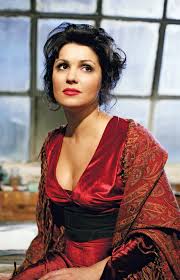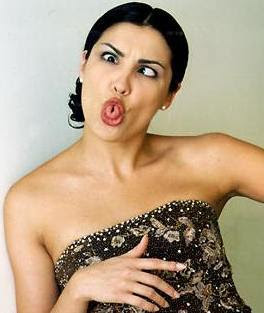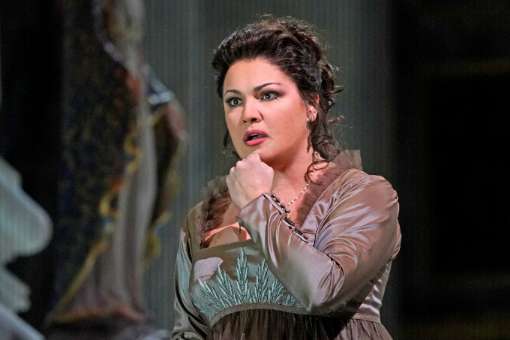|
SATURDEE OPRY LINKS 26:
"Wild Anna" Netrebko Special!
  
The varied moods of Anna Netrebko.
Saturdee Opry Links Overture!
"I Vespri Siciliani," by Verdi. (Great one.)
https://www.youtube.com/watch?v=WodoUXIdnwg&fbclid=IwAR1gm9JKiOdsSVGxNA6da9FR12QUVwEgyNA6GH3LvZOVjDMRpKieeM7k3sc
1.
Saturdee Opry Links opens with "Wild Anna" Netrebko (more later), with a brisk,
jaunty aria from Verdi's "I Vespri Siciliani." Note: the opera was written in
French, later translated (badly) into Italian, and for bizarre reasons the
setting was changed from Sicily to Portugal. This is a tour-de-force by Netrebko
(in my opinion), whose voice has both might and lustrous beauty.
https://www.youtube.com/watch?v=ki3R32Irrb4
Setting: the gardens of the palace of Montfort, Palermo, 1282
Synopsis: Before being married to Henri, Hélène sings of her great joy in a
dance-like fashion that is more akin to a Spanish bolero than a siciliana. At
the same time, her joy has been tempered because she has discovered that their
wedding bells will be the signal for the Sicilian uprising and massacre of the
French.
Translation:
http://www.aria-database.com/search.php?individualAria=527
About the opera:
https://en.wikipedia.org/wiki/I_vespri_siciliani
2.
"The future is female?" One hopes not, if Lady MacBeth is any
indicator. Here, Netrebko sings the praises of cunning and deceit from Verdi's "MacBeth." A short
but potent aria.
https://www.youtube.com/watch?v=_ogsDRwTxoQ
Setting: A hall in Macbeth's castle, Scotland
Synopsis: Lady Macbeth has just read a letter aloud from Macbeth saying that he
has been appointed Thane of Cawdor and, right before he was appointed Thane, a
group of witches prophesied that he would be both Thane and King soon. Lady
Macbeth is excited about this prospect and sings of this excitement that her
husband will soon be King of Scotland.
Translation:
http://www.aria-database.com/search.php?individualAria=429
EXTRA:
Netrebko is the most winning soprano alive. She is irrepressible, outspoken,
giddy, funny, impulsive, explosive, and brilliant. Here is the lede of an Opera
News profile of her from 2013:
"I'm sorry — at the end, I would fuck the guy! So I have nothing in common with
Tatiana — only language!” With that summation of Eugene Onegin, in which she’ll
open the Metropolitan Opera’s 129th season on September 23, Anna Netrebko
explodes into the Met press office, wearing a bulky-knit neon acid-green sweater
over a metallic black miniskirt. I have met plenty of dazzling people in my
time, but Netrebko is more charismatic than any of them; at forty-one, she seems
lit from within and animated by a charming, benign mania. If this is a put-on,
it is masterful.
And here is a new piece about Anna, now 47, from the NYT---complete with
characteristically zany Instagram photos.
https://www.nytimes.com/2018/12/07/arts/music/anna-netrebko-carnegie-hall.html?fbclid=IwAR1vEHW7Hu0DIuaca_1Jkgn_MgGXL4PwBUm-9jKTOtY1f07DxRE29TqRC-g
3.
Ignore the silly production design. (Oh, gee, a big clock. I get it! Time is running out!)
There are singers who sing wonderfully, act wonderfully, and sing and act
wonderfully. And then there are singers who simply become the character---or, as
is the case here, the character becomes the singer. There are those who would
accuse Netrebko of scenery-chewing, and with justification. But hell, this is
opera. Where is there tastier scenery to chew? In other words, this is
inimitably Netrebko. From Verdi's "La Traviata," this
is the aching, lilting, piquant "Addio del Passato" ("Farewell to the past;
happy dreams of days gone by.")
https://www.youtube.com/watch?v=cSr7hh9mbyg
Setting: Violetta's bedroom
Synopsis: Violetta is now poor and about to die. She receives a letter from
Alfredo's father saying that Alfredo has discovered why she lied about her love
for him and is coming to her. She knows that it is too late, though, and sings a
farewell to her happiness with Alfredo.
Translation:
http://www.aria-database.com/search.php?individualAria=310
4.
Netrebko has bulked up a big in middle age (she seems to like to cook hamburgers
at home, as her Instagram post suggests, and she is prone to dining at Denny's---yech!),
and you could say that her voice has gained weight, as well---in a good way. Anthony Tommasini wrote this of her recent debut at the Met as "Aida:" "Ms. Netrebko,
who started off as a lyric soprano, has been more of a surprise as she’s moved
into challenging bel canto repertory and weightier and more dramatic roles. This
Aida proved yet again that she knows what she is doing." More hefty roles are
sure to follow. Here she is in that Met "Aida," singing "O Patria Mia:" ("Oh, my
country---never more will I see you.") This is a dazzler. Note the touch of awe
in the audience response; people seem too amazed to go into the usual
bravo-shouting competition.
https://www.youtube.com/watch?v=xUmQW9MXElI
Setting: The banks of the Nile
Synopsis: It is the eve of Amneris' wedding to Radamès and Aida has come to the
banks of the nile near the temple to meet Radamès. She mourns her homeland which
she will never see again.
Translation:
http://www.aria-database.com/search.php?individualAria=6
Tommasini:
"Her voice also retains aspects of the slightly cool, focused tone
characteristic of the Russian style she was raised in. This distinguishes her
Verdi and Puccini singing from the typical throbbing Italianate approach. On
Wednesday, in “O patria mia,” Aida’s wrenching Act III aria, Ms. Netrebko sang
the music’s plaintive, long-spun phrases with a subdued yet penetrating beauty
that recalled the great Leontyne Price, who once owned this role."
https://www.nytimes.com/2018/09/27/arts/music/anna-netrebko-aida-met-opera-review.html
EXTRA:
Here is a backstage interview at the Met with Netrebko and Anita Rachvelishvili
during "Aida." Terrible, really, that they must be interviewed between acts, as
this puts extra strain, I would think, on maintaining character and mood. Quite
interesting comments from Netrebko. Note her no-nonsense remarks at 00:56 and
4:55.
https://www.youtube.com/watch?v=fJU6Fb58Kzo&fbclid=IwAR13oyEOmDzWXpfAZnQAtu7W0OweX8tcOd2VKI1Nkp2SH_yep9P2p-uHTAI
5.
Netrebko will soon debut in the less-performed "Adriana Lecouvreur," by Cilea,
at the Met. Long a kind of vehicle for sopranos who are past their prime, owing
to arias that are gorgeous but lacking in challenging high notes, it will be
interesting to hear a soprano at the peak of her abilities assay the role. Here
is a preview. Netrebko sings the tender, haunting "Io Son L'UUmile Ancella."
("I'm but the humble servant of the creator. . .")
https://www.youtube.com/watch?v=JJW3Cnq_E_4
Setting: backstage at the Comédie-Française, Paris, 1730
Synopsis: The Prince de Boullion and the Abbe de Chazeuil meet the company at
the Comédie-Française before the show. Although the Prince is the patron of
Adriana's main competition as an actress, Duclos, he compliments Adriana. She
replies to the compliments by saying that she is only the vessel through which
the muses work.
Translation:
http://www.aria-database.com/search.php?individualAria=1109
6.
Netrebko says she has zero in common with her character, Tatiana, in
Tchaikovsky's brooding "Eugene Onegin." This is a good example of her strengths
as an actress coming into play. As she said of the final scene in "Onegin," "I'm
sorry — at the end, I would fuck the guy! So I have nothing in common with
Tatiana — only language!” Yes, sigh, she really said this. Here is that final scene, with English subtitles.
https://www.youtube.com/watch?v=_u3rum8k7pg
Summary:
Scene 2: A room in Prince Gremin's house
Tatyana has received Onegin's letter, which has stirred up the passion she felt
for him as a young girl and disturbed her. Onegin enters. Tatyana recalls her
earlier feelings and asks why Onegin is pursuing her now. Is it because of her
social position? Onegin denies any cynical motivation: his passion is real and
overwhelming. Tatyana, moved to tears, reflects how near they once were to
happiness but nevertheless asks him to leave. He asks her to have pity. Tatyana
admits she still loves Onegin, but asserts that their union can never be
realized, as she is now married, and determined to remain faithful to her
husband despite her true feelings. Onegin implores her to relent, but she bids
him farewell forever, leaving him alone and in despair.
7.
I say that Netrebko is a phenomenon with parallels to Callas, Pryce, Edith
Piaf(!), Mario Lanza. Huh? What's he talkin' about? Just this: she is
able to essentially throw herself into her
singing, with abandon. Of course, for all I know, I could be totally off-base. Perhaps she is
constantly fretting about technique, etc., but it sure does not come across.
(And persnickety critics take issue with her pitch, pronunciation, etc.) Here is
a germane quote:
"I have so many things coming up! I have to study, and I don't like to. I'm so
scared. Giovanna d'Arco, Trovatore, Faust, Manon Lescaut with Maestro Muti. I
like to sing Puccini. It's very easy for me, but you have to be very careful.
Manon Lescaut is huge for tenor, but not big singing for soprano, if you have
great conductor who will not drown you out. It's a pleasure to sing Puccini, but
then afterwards, I must have some time. I can't jump from one to another."
And here she is on stage in Rome with "In quelle trine morbide," from Puccini's
"Manon Lescaut." The video quality is poor, but the vocalizing is wunderbar.
https://www.youtube.com/watch?v=gxpt0DX734M
Or if you prefer a studio version:
https://www.youtube.com/watch?v=TLxvl-ljax8
Setting: Geronte’s house, Paris, France, 18th century
Synopsis: Remembering Des Grieux’s love, Manon is not sure she made the right
decision to live with Geronte. Even with the luxury she has, there is something
that chills her soul.
Translation:
(Italian:
http://www.aria-database.com/search.php?individualAria=534 )
English:
http://classicalplus.gmn.com/classical/work.asp?id=2002¬es=true&webcast=true
8.
Such a range of vocal colors. . .indeed able to combine lyric soprano nuance
with wonderful chest voice deep notes and spinto power. And to sing operatically is just so, so complex. Here is a good
quote:
"I always had a middle voice, but I had to work on it, to put it in the right
position — especially for Lady Macbeth, which must have the chest voice. I do
have, absolutely natural, without any force, chest voice. From the Nature. I
didn't do anything to get it. I have been working with a great guy in Vienna,
Daniel Sarge, who has ears, especially for soprano. He was the one who said I
should sing the Macbeth. He told me he would prove it to me. I was, of course,
afraid. But it doesn't have such a big orchestra, like Abigaille. It's just
there is so much middle. Most importantly, the character has to be there. When I
was recording the sleepwalking scene, this was not coming. Everything sung
perfect from note to note. I was not forcing. But it was not there. It took a
couple of months to find out what was wrong."
And here is Dvorak's pseudo-Puccini aria, "Měsíčku na nebi hlubokém' ('Song to
the Moon'), from "Rusalka."
https://www.youtube.com/watch?v=Ry-iKGaKpmU
Role: Rusalka, daughter of the Spirit of the Lake
Setting: A clearing on the shore of the lake, medieval times
Synopsis: Rusalka has fallen in love with a Prince. Unfortunately, Rusalka is a
water sprite and cannot come out of the water or communicate with him. She asks
the moon to tell her love that she is thinking of him.
Translation:
http://www.aria-database.com/search.php?individualAria=757
9.
In 2015, Netrebko married Azerbaijani tenor Yusif Eyvazov. No wonder she goes
out of her way to not overshadow him here, in this Ernesto De Curtis standard,
"Non Ti Scordar Di Me" ("Do not forget me!") on stage at the Palace Square in
St. Petersburg.
https://www.youtube.com/watch?v=QxQG1JxKQ7U
Translation:
https://lyricstranslate.com/en/non-ti-scordar-di-me-dont-forget-about-me.html
Excerpt:
"The swallows left
From my cold and sunless country,
Searching for Springs full of violets
And lovely and happy nests.
My little swallow left
Without leaving me a kiss
She left without a goodbye. . ."
FINAL BOW:
Anna Netrebko:
"I want to go to cinema, I want to read books, I want to experience something
new, but I never have time for that! You know what I want? I want somebody in my
life — a friend, or a mentor — to really teach me something totally new. Like,
let me experience with my soul, my brain, my everything, but to open for me
something very new. Make me interested. I think that's what I really need! I
think the life is so short. I want to live another three hundred years!"
Earlier this year on stage at the Bolshoi, the "new" Netrebko---with her
heftier, darker voice, sang "Vissi d'arte" from Puccini's "Tosca." "I lived for
art. . ."
Setting: Scarpia's study
Synopsis: In the midst of being blackmailed into sex with Scarpia in exchange
for sparing Tosca's lover, Tosca sings of the two great driving forces in her
life: love and music.
https://www.youtube.com/watch?v=5Y4mDsgCyyo
Translation:
http://www.aria-database.com/search.php?individualAria=302
Saturdee Opry Links Netrebko Special Encore!
https://www.youtube.com/watch?v=eGiz_QWCEkU
Wild Anna Netrebko at her best, or at least most fun. She and the audience have a grand time of it with this Franz Lehar tune, "Meine
Lippen sie küssen so heiss" ("My lips' fiery kiss.") I wouldn't mind her tossing
a flower my way. . .
Translation:
http://www.lieder.net/get_text.html?TextId=27407
Back to Opera Links
Back to Home Page
|



